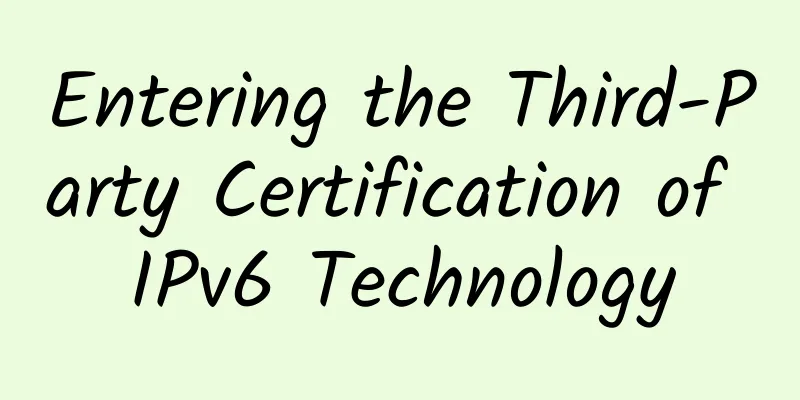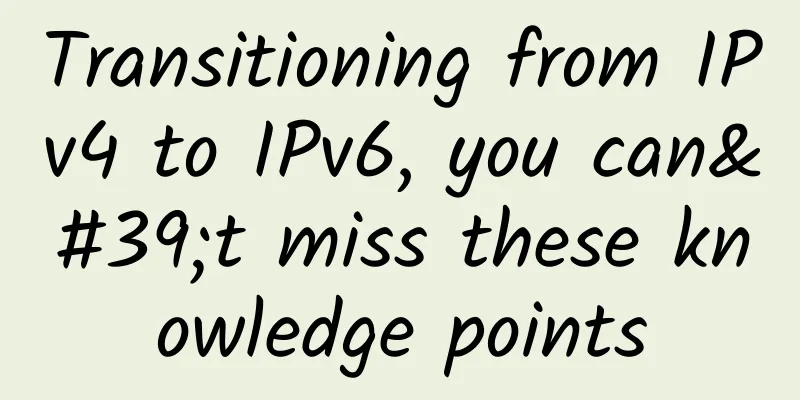Entering the Third-Party Certification of IPv6 Technology

|
IPv6 certification assesses products, networks and technical personnel who implement IPv6 technology. Its purpose is to standardize the development of the IPv6 industry, improve the level of IPv6 technology, set examples and encourage everyone to follow suit.
In every technical field, there are relatively professional third-party neutral organizations that evaluate the application level of these technologies so that people can have a better understanding of the actual capabilities of these technologies. Since we need to certify technologies, on the one hand, we must ensure that they are treated equally and adopt unified certification standards; on the other hand, we must ensure professionalism, and the gold content of the certification must be high, and people must have a high degree of recognition of the certification. 2018 is the year when IPv6 technology ushered in large-scale trials and deployments. However, the implementation of various networks and the support of various network devices are uneven in quality, and there are also many unsophisticated ones. Therefore, it is particularly important to introduce professional third-party certification, which is also a manifestation of proving the professionalism of one's own network and equipment. IPv6 technology is no exception. It has its own set of technical standards, as well as a third-party professional certification agency, the Global IPv6 Testing Center. The Global IPv6 Testing Center was established in 2008. It is the earliest authorized IPv6 certification laboratory of the Global IPv6 Forum and is also the executive unit of the IPv6 Enabled Logo certification project. It is called the Global IPv6 Testing Center, which actually comes from China. It is an institution under the China Next Generation Internet National Engineering Center and has been actively promoting the practice of IPv6. The IPv6 Testing Center has been focusing on the formulation of test standards for the next generation Internet of IPv6, the construction of test platforms, and the research and development of testing areas such as consistency, interoperability, automation and performance. At the same time, it provides authoritative testing and certification services including IPv6 Enabled, IPv6 Ready, IPv6 Education and other projects to the world. These are all well-known certification projects in the IPv6 industry. After passing the certification, you will obtain the internationally universal IPv6 Enabled WWW Logo and global certification number issued by the Global IPv6 Enabled Logo Certification Committee, which can be displayed on the corresponding website or device to provide proof of technical level and enhance brand value. After passing the certification, you can also apply for website certification, query the list of certified websites, test reports and certificates and other services. Since we are doing IPv6 certification, we naturally need to refer to the IPv6 network technology standards. There are dozens of IPv6 network protocols, and there are nearly ten core protocols: RFC1981, RFC4861, RFC4862, RFC2460, RFC5095, RFC4291, RFC4443, RFC2474, RFC3168. All certification tests are carried out around these protocol standards to check whether the implementation of the tested network or device complies with these IPv6 RFC standards. It is far from enough to just comply with the protocol implementation. IPv6 certification also requires interoperability testing, functional testing, performance testing, business testing, transition technology testing, etc. It is not easy to pass the IPv6 certification test, and you need to have strong IPv6 technical strength. It is precisely because of the strict testing that IPv6 Enabled Logo and IPv6 Ready have become the only authoritative IPv6 certifications in the world. IPv6 Enabled Logo has enhanced the core value of IPv6 equipment vendors' products and provided a basis and reference for equipment buyers; IPv6 Ready has provided testing and certification services for ITU, France Telecom, NTT and many operators. Obtaining the two certifications, IPv6 Enabled Logo and IPv6 Ready, is a reflection of the strength of one's IPv6 technology. IPv6 certification is not only for equipment manufacturers and network operators, but also for individuals. IPv6 Education is the most professional and authoritative certification in the field of IPv6. Obtaining this certification indicates that the holder has the corresponding IPv6 professional level. Students, technicians, practitioners, people who intend to participate in IPv6-related work in the future, and even the public who are interested in IPv6 can apply for IPv6 Education certification. Table 1: IPv6 Education Network Engineer Certification Classification There is an exam outline on the website of the Global IPv6 Testing Center. You can prepare for the exam according to the requirements of the exam outline. There are three certification exam opportunities every year. Currently, thousands of engineers have passed the gold and silver certifications. In addition to the IPv6 Testing Center, many network equipment vendors such as Cisco, Huawei, and H3C also have IPv6 technology certification exams. The focus of each exam is different, but they are basically centered around IPv6 standard protocol technology to promote IPv6 technology. IPv6 certification is currently only active in the field of equipment vendors. Equipment purchasers are also concerned about IPv6 certification. If the equipment cannot pass the IPv6 certification, it will basically not be considered for purchase. Therefore, new network equipment will basically apply for IPv6 certification to prove that their equipment has the ability to deploy IPv6. Equipment vendors will also publicize the IPv6 certification certificates to prove themselves. Therefore, there are many types of equipment participating in the IPv6 Enabled Logo certification. The participation rate of IPv6 Ready is not high. Internet companies are relatively advanced in technological innovation and participate in IPv6 Ready certification more. In addition, some operators' data centers also actively participate, but other fields are relatively rare. Compared with the number of people engaged in network technology, the number of participants in IPv6 network engineer certification is still relatively small, and the activity of IPv6 certification is not high. The main reason for this phenomenon is that people engaged in network technology are unlikely to only engage in IPv6 technology work. They often have to contact and deal with various network protocols. The value of IPv6 engineers is not high, and it is not that they are great just because they have passed the IPv6 certification. This leads to not many people actively participating in IPv6 network engineer certification. The vast majority of network engineers learn while doing, and are driven by things to learn IPv6. This also leads to far fewer professionals in IPv6 network technology, which has become a talent bottleneck encountered in the large-scale deployment of IPv6. IPv6 certification assesses products, networks and technicians that implement IPv6 technology. The purpose is to standardize the development of the IPv6 industry, improve the level of IPv6 technology, set up models and encourage others to follow suit. Actively promote certified products, networks and individuals to enhance the enthusiasm for participating in IPv6 technology. At present, there are too few third-party certifications for IPv6 technology, and there is only one professional one. With the popularization of IPv6 technology, there will be more and more such certification needs. Third-party certification agencies need to increase and go global. Although the Global IPv6 Testing Center is rooted in China and faces the world, the main customers it actually serves are in China, and a true world standard has not yet been formed. In the United States, there is NIST (National Institute of Standards and Technology). NIST has USGv6 Profile and USGv6 Test Plan, which uses profiles and test procedures to guide product procurement and accredited testing laboratories that work with the supplier community to complete and record standardized consistency and interoperability testing of emerging IPv6 products, which is similar to the certification work of the Global IPv6 Testing Center. Therefore, the certification influence of the Global IPv6 Testing Center is not enough and needs to be continuously expanded. |
<<: CC attack & TCP and UDP correct opening posture
Recommend
Experts discuss: How will 5G accelerate after the epidemic?
It was supposed to be a time to get rid of the ol...
From "Integration" to "Huawei Inside", Huawei builds a new ecosystem in the intelligent era
[51CTO.com original article] [Fuzhou, China, Marc...
Five driving forces and four challenges for 5G development
At the end of June, MWC19 Shanghai was once again...
Friendhosting: 2024 promotion 30% off, 13 data center VPS monthly payment starting from 2.1 euros
Friendhosting has frequent promotions at the end ...
[CyberMonday] DediPath Los Angeles VPS 50% off starting at $10/year, dedicated server starting at $45/month
DediPath has launched a Cyber Monday promotion....
In the interview, I was asked how the reliability of TCP is guaranteed?
We know that TCP is reliable. Our previous articl...
How does the redundancy function of Industrial Ethernet ensure the stability of the network?
Due to the extremely high requirements of industr...
The third quarter data is out. Are the three major operators standing still or accelerating?
[[431529]] Recently, the three major operators ha...
Interviewer asked: What are the functions of the wait and notify methods in threads?
1. Introduction In the previous thread series art...
Saving Energy in Smart Buildings with PoE Switches
This is not something that happened overnight, bu...
Seven steps to SD-WAN deployment
The benefits of software-defined WANs are appeali...
Dongfangtong, China Power Construction, and China Power Fufu signed a strategic cooperation agreement on emergency industry to create "smart +" emergency services
[[268567]] On June 20, with the theme of "In...
The results of the 14th 51CTO China Enterprise Annual Selection are out!
[51CTO.com original article] On January 6, 2020, ...
Will edge computing replace cloud computing? Has the strongest dark horse in the 5G era emerged?
Computers are hundreds of miles apart, but the la...
10gbiz: Hong Kong CN2 GIA/Los Angeles CN2 GIA VPS 50% off, starting from $3.44/month
A friend asked about the discounts of 10gbiz this...









